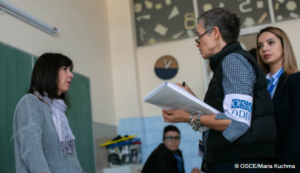
Elections are a critical part of our democracy. They enable individual voters to hold those in public office to account and to determine who occupies leadership positions: whether as Presidents, as representatives in parliament or at a local level.
There are a range of international commitments and internationally-agreed standards on how countries should run their elections. This includes ensuring they are periodic, genuine, free and fair, with universal and equal suffrage and voting undertaken by secret ballot. In the OSCE – the commitments of participating States to holding democratic elections date back to the pivotal 1990 Copenhagen Document.
Within the OSCE it is the autonomous Office for Democratic Institutions and Human Rights (ODIHR) that is the guardian of all 57 participating States’ commitments on human rights, fundamental freedoms and democracy. This includes an important role in observing elections. ODIHR’s election observation reports have clear recommendations on specific areas, and are all stored on their “electoral recommendations” database.
When ODIHR arrives in a country to observe elections it starts from a simple premise – that there should be continuous improvement in the holding of democratic elections in all countries. In this way, ODIHR’s clear recommendations to each country help improve our electoral processes in a tailored way and provide a useful starting point for the next election. This “building block” approach ensures that each of our individual democracies can be supported appropriately, which builds on past successes and addresses previous failings. It is much better than a “one-size fits all” approach.
ODIHR monitors the full election period, providing detailed, impartial information. Key questions, which are built up over time and multiple elections and – based on the tailored approach described above – can be assessed in individual elections, include:
- How effective and impartial is the election administration?
- How robust is the legislative framework in place for elections?
- What is the process for candidates and political parties to register?
- What is the nature of the campaign (including the media environment) and is there a level playing field for all participants?
- Are citizens’ freedom of expression, assembly, association and movement being upheld?
A colleague in the UK Delegation took part in OSCE’s Election Observation Mission in Ukraine in the summer of 2019, for the parliamentary election. Their work as a short-term observer involved monitoring throughout polling day in the region of Poltava, starting early in the morning and leaving the last polling station at 5.40am the next day. Together with the effective organisation and set up of the mission, what struck most was the impressive scale and ability of ODIHR to collect information from hundreds of teams of observers, spread throughout the country, and collate this into a valuable, thorough and detailed preliminary report so efficiently.
ODIHR works closely with other international monitoring teams, including observers from the OSCE’s Parliamentary Assembly and the Council of Europe. To fulfil their mandate, ODIHR needs timely invitations from host countries, allowing time to assess the observation requirements for each election.
COVID-19 has presented a unique challenge to ODIHR’s election observation work, but one to which they have responded effectively. Health and travel restrictions have obviously impacted the scale of observation missions. Nevertheless, it is commendable that ODIHR still managed to observe and assess 16 elections during 2020 and this has continued with elections into 2021. This provides reassurance to citizens across the OSCE area that, even in challenging times, the OSCE continues to prioritise the core principles and commitments around democratic elections that its 57 countries freely signed up to. ODIHR will look to transition back to more normal observation missions in terms of structures and numbers of observers deployed when it can.
It is important both as participating States and individuals to stand up for and support the good work of institutions like ODIHR, which help us strengthen our democracy and our rule of law. Security is a state of “being free from danger or threats” Working to ensure our countries have a well-functioning and robust system to hold our leaders to account – through free and fair elections – is an essential safety valve. It is the ultimate collective form of freedom of expression. And it makes each and every one of us more secure.
